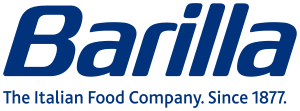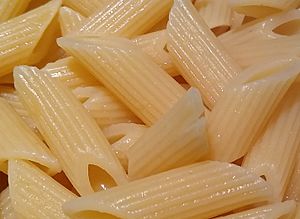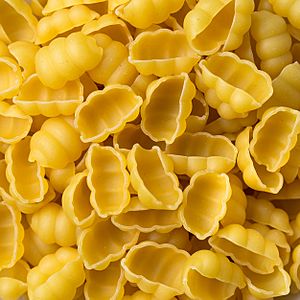Barilla (company) facts for kids
 |
|
| Società per azioni | |
| Industry | Food processing |
| Founded | 1877 |
| Founder | Pietro Barilla Sr. |
| Headquarters |
,
Italy
|
|
Area served
|
Worldwide |
|
Key people
|
Guido Barilla (chairman) |
| Products |
|
| Revenue | |
|
Operating income
|
|
| Total assets | |
| Total equity | |
|
Number of employees
|
8,827 (2024) |
| Divisions | 21 brands |
Barilla is a famous Italian food company. It started in 1877 and is now one of the biggest food companies in the world. Barilla is best known for being the world's largest producer of pasta. Their main goal is to bring "The Joy of Food for a Better Life."
Contents
The Story of Barilla
The Barilla company began in 1877 as a small bakery in Parma, Italy. It was founded by Pietro Barilla Sr. The company grew, and by 1910, Barilla opened a new pasta factory. This factory had a special "continuous baking" oven.
After Pietro Barilla Sr. passed away, his sons Riccardo and Gualtiero took over. They made the company bigger by using new technology. This helped Barilla become a very important bread and pasta company in their region during the 1920s and 1930s.
Later, Pietro and Gianni, from the third generation of the Barilla family, took charge. In 1952, they decided to stop making bread and focus only on pasta. Barilla quickly became well-known across northern Italy. This was because of their good quality products, fair prices, and new ideas, like using cardboard boxes to package pasta.
In 1960, Barilla became a joint-stock company. This means it could sell shares to others. In the years that followed, they opened new factories. One factory in Rubbiano started making crackers and breadsticks. Another big factory opened in Pedrignano, near Parma.
The Barilla family owned the company until 1971. Then, an American company called W. R. Grace bought most of it. However, Pietro Barilla, the grandson of the founder, still managed the company day-to-day. In 1979, Pietro bought the company back. Since then, it has remained a private family business.
In 1993, Pietro Barilla passed away. His children, Guido, Luca, and Paolo, took over. They are the fourth generation of the Barilla family to lead the company. They continued to expand Barilla around the world. In 1999, they opened their first factory in the United States, in Iowa.
Barilla also bought other food companies in different countries. These included the MISKO pasta company in Greece (1991) and the Turkish pasta company Filiz Makarna (1994). They also bought the Swedish crispbread maker Wasabröd (1999). In 2002, they partnered with a Mexican company for pasta brands Yemina and Vesta. In 2021, Barilla bought the Catelli company in Canada and a big part of Pasta Evangelists in the United Kingdom. Pasta Evangelists makes fresh pasta for home delivery. In December 2022, the company also bought Back To Nature, a US brand known for plant-based foods.
What Barilla Makes and Does

The Barilla family has been leading the company since it started in 1877. The Barilla Group owns many well-known brands. These include Barilla pasta, Mulino Bianco (bakery products), Pan di Stelle (biscuits), Pavesi, Voiello, Harrys (France), Wasabröd (Sweden), Catelli (Canada), MISKO (Greece), Pasta Evangelists (United Kingdom), Filiz Makarna (Turkey), and Back To Nature (United States).
Barilla makes many different kinds of pasta. They are the world's top pasta maker. They produce pasta in over 160 shapes and sizes! Barilla pasta is sold in many restaurants around the world. The company is also a top seller of bakery products in Italy and ready-made sauces in Europe. Through its Wasa brand, Barilla is the world's leading producer of flatbread.
The Barilla Group has 30 factories around the world. Fifteen are in Italy and fifteen are in other countries. These include Greece, France, Germany, Russia, Sweden, Turkey, the United States, Mexico, and Canada. Barilla also runs mills (places that grind grain) in several countries. While its main office is in Parma, Italy, Barilla has offices in many other countries too.
In 2024, the company made €4.883 billion in sales. They had a profit of €142 million. In 2025, Barilla was ranked as the top food company for its good reputation for the second year in a row.
Other Barilla Activities
Barilla does more than just make food. In 1987, Pietro Barilla started the Barilla Historical Archive. This archive collects and saves the company's old documents, photos, and advertisements from 1877 onwards. It helps people learn about the company's past. The archive is located at the Barilla factory in Pedrignano, near Parma.
In 1999, the Italian Ministry of Culture said the Barilla Historical Archive was "of remarkable historical interest." This means it is very important for understanding the history of the food industry in Italy. Since 2018, you can visit the archive online. You can see photos and over 2,700 TV commercials!
The Barilla Historical Archive also helped create the Museum of Pasta in 2014. This museum is located near Parma. It has old pasta-making equipment and documents, including a pasta plant from 1850. The Museum of Pasta is part of the Museums of Food in the Parma area. The Museum of Tomato is also in the same place.
In 2009, the Barilla Center for Food & Nutrition (now called "Fondazione Barilla") was created. This group works to make food production more sustainable and to encourage healthy lifestyles.
Sponsorships and Promotions
Barilla works with famous athletes to promote its products. Since 2020, the tennis star Roger Federer has been a global spokesperson for the company. Barilla has also sponsored the Italian national basketball team. They also sponsor the US alpine skier Mikaela Shiffrin and tennis player Coco Gauff.
In 2021, Barilla even created a Spotify playlist! The songs on the playlist are timed to be just long enough to cook pasta perfectly. In 2025, Formula One announced that Barilla would be the sport's "official pasta partner."
MISKO (Barilla Hellas A.E.)
Barilla Hellas A.E. is a Greek company owned by the Barilla Group. It is known by its local name MISKO (Μίσκο). MISKO makes and sells pasta in Greece and to Greek people living in other parts of the world.
MISKO is the largest pasta producer in Greece. It was founded in Piraeus in 1927. Barilla bought MISKO in 1991. MISKO sells both Barilla's pasta and sauces, as well as its own products. In 2000, the company built a new factory in Boeotia, which is the third largest in Europe.
Barilla and Russia
In April 2022, Barilla announced that it would stop all new investments and advertising in Russia. They said they would only produce essential food items like pasta and bread there. They also promised not to make a profit from their business in Russia. However, Barilla's Russian branch actually reported higher profits in 2022 compared to 2021. As of December 2024, Barilla continues to operate in Russia.
See also
 In Spanish: Barilla para niños
In Spanish: Barilla para niños
 | Selma Burke |
 | Pauline Powell Burns |
 | Frederick J. Brown |
 | Robert Blackburn |


